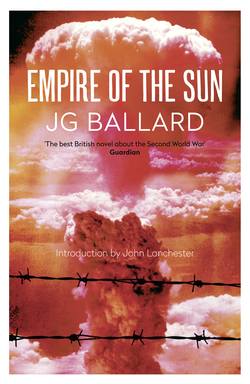Читать книгу Empire of the Sun - J. G. Ballard, John Lanchester, Robert MacFarlane - Страница 24
Оглавление10
The Stranded Freighter
Cold sunlight shivered on the river, turning its surface into chopped glass, and transforming the distant banks and hotels of the Bund into a row of wedding cakes. To Jim, as he sat on the catwalk of the funeral pier below the deserted Nantao shipyards, the funnels and masts of the Idzumo seemed carved from icing sugar. He cupped his hands into a pair of make-believe binoculars and studied the white-suited sailors, as busy as lice, who moved around the decks and bridge. The cruiser’s gun turrets reminded him of the candied decoration on the Christmas cakes whose overripe flavour he had always hated.
All the same, Jim would have liked to eat the ship. He imagined himself nibbling the masts, sucking the cream from the Edwardian funnels, sinking his teeth into the marzipan bows and devouring the entire forward section of the hull. After that he would gobble down the Palace Hotel, the Shell Building, the whole of Shanghai …
Steam throbbed from the Idzumo’s funnels, calmed itself and drifted across the water in a delicate veil. The cruiser had drawn its stern anchors and was swinging on the tide, bows pointing downstream. Having helped to impose Japanese rule upon Shanghai, it was about to sail for another theatre of war. As if celebrating, a regatta of corpses turned on the tide. The bodies of scores of Chinese, each on a raft of paper flowers, surrounded the Idzumo, ready to escort the cruiser to the mouth of the Yangtze.
Jim kept watch for the Japanese naval patrols. Across the river, on the Pootung shore, were the galvanized roofs and modern chimneys of his father’s cotton mill. Jim vaguely remembered his visits there, embarrassing occasions when the Chinese managers paraded him under the expressionless gaze of thousands of mill girls. Now it was silent, and what concerned him was the boom of the sunken freighters. The nearest of the wrecks, a single-funnel coaster, sat in the deep-water channel only a hundred yards from the end of the funeral pier. Its rusting bridge, like a crumbling brown loaf, still held all its mystery for him. War, which had changed everything in Jim’s world so radically, had long since left this forgotten wreck, but he was determined to go out to the ship. Rejoining his parents, giving himself up to the Japanese, even finding food to eat, meant nothing now that the freighter was at last within his reach.
For two days Jim had wandered along the Shanghai waterfront. After being discovered by the Japanese patrol he set off for the Bund. His only hope of seeing his parents again was to find one of their Swiss or Swedish friends. Although the European neutrals drove through the streets of Shanghai, Jim had not seen a single British or American face. Had they all been sent to prison camps in Japan?
